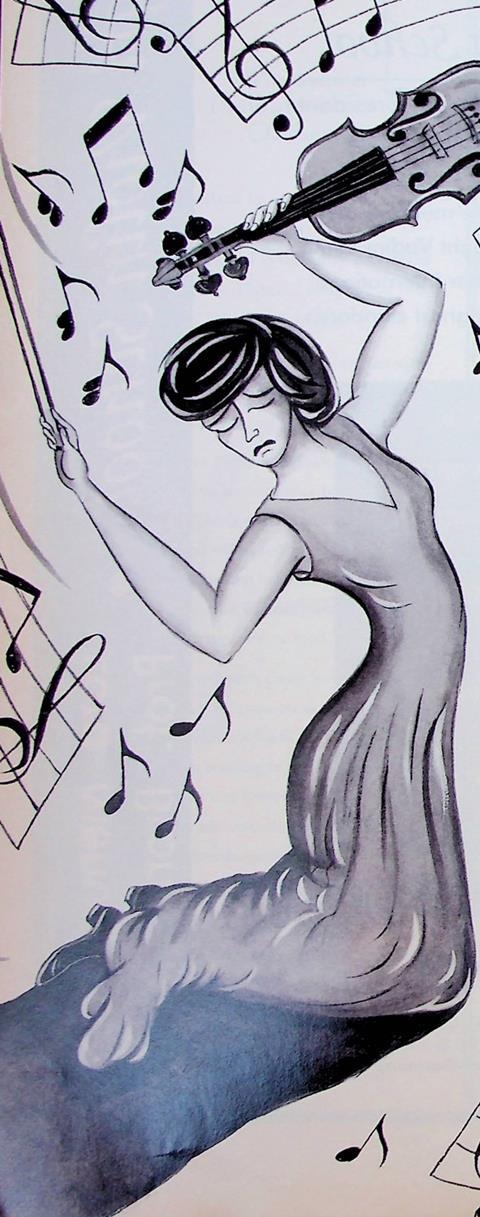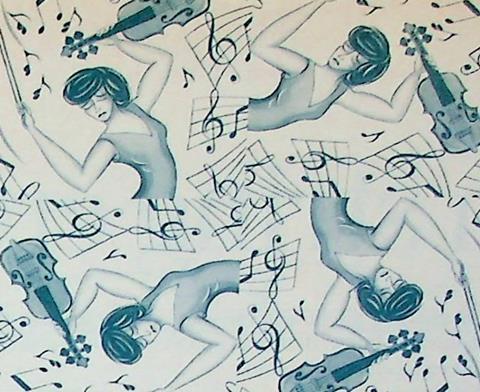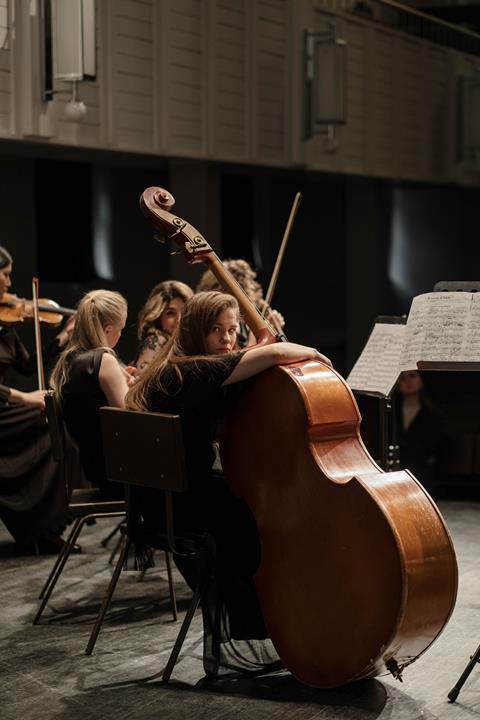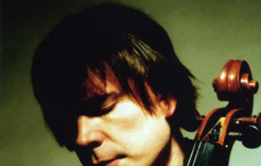How often has a potential performance of a lifetime turned into a performance from hell? Are you suffering from from stage fright? Laurinel Owen gives advice overcoming this common affliction, from the December 1996 issue

’I hope I won’t mess up the semiquavers on the next page… my gosh. I can’t believe he’s here. I wonder what he’s thinking… oh man. I missed that shift. I’ve got to try harder on the next one…why is my bow shaking… hold it lighter… that kid on the front row is kicking his feet, he’s going to mess me up… did I count three or four bars rest?’
A little adrenalin can tilt a performance from good to extraordinary, but too much can cause the classic symptoms of blurred vision, upset stomach, racing heart, confused thoughts, the need to go to the toilet, trembling bow, tight muscles and general panic. As if all this were not bad enough, many players are not only afraid of performing but also worry about facing stage fright itself. These debilitating physical symptoms are caused by what psychologists term the ’fight or flight response, in other words, the body responding as if danger is present.
Carter Brey, newly appointed principal cellist of the New York Philharmonic, was quoted in the New York Times (2 September 1996) concerning his recent audition: ‘The whole thing about being a performer is being able to master the psychological tricks that you play on yourself.’ In their excellent book Controlling Stagefright, Peter Desberg and George D. Marsh succinctly identify the cause of performers’ fears.
’Everyone likes to look good in front of an audience. If you think they will evaluate you negatively, you wall become anxious and experience stage fright. It will be worse if the consequences of that negative evaluation are serious. The big question is how to cope. The following advice has been culled from books and articles concerning stage fright experienced by musicians, actors, speakers and business executives. It also includes techniques used by athletes and sports psychologists who aim for peak performance. When looking for a solution to your personal performance anxieties consider trying several different approaches; there may not be a simple one-step solution.
Psychologists recommend that you first analyse your emotional and intellectual reasons for being afraid. Expose them and let them come out rather than suppress them. Robert Triplett, in his book Stage-Fright: Letting it Work for You, comments: ’People are taught not to show emotions — especially men — it shows weakness. We mask stage-fright, fearing that by revealing it, the symptoms will intensify. So we hide it.’
When you really analyse your fears you may find they are exaggerated or unjustified or that your thinking proves was faulty. You may be projecting your feelings of doubt and your own critical nature onto the audience, expecting that they are there to find fault with you. Do you have that same negative attitude when you go to hear a friend or attend a concert hall or are you sympathetic and look forward to enjoying the music?
Stage fright occurs when you anticipate failure and these negative thoughts make you anxious. According to Desberg and Marsh ’the brain can only focus attention on one complex mental task at a time’. So an important aspect in calming these fears is to eliminate the self-talk or dialogue which can distract you from the complexities of playing your instrument. Learning to think only in the present and not back to the mistake you just made or the double-stops coming up is a many-sided problem, but in essence, you must learn to really concentrate.
Research on Olympic athletes during the moments of deep concentration preceding peak performance shows that the left side of the brain (the analytical side) relaxes and the right side (the artistic and interpretive side) takes over. This results in a trance-like state in which self-doubt and worry is not present and the mind allows the body to perform as it has been trained to do during practice without any self-imposed interference. The key is to be able to enter this state of deep concentration at the right moment.
Preparation is essential. You must have a deep knowledge of Ithe music you perform. This means that your practice time should not only include repetitions of the ‘hard parts’. The violin teacher Kato Havas emphasises this point in Stage Fright: Its Causes and Cures ‘Few people realise that faulty practising is, more often that not, the deepest and greatest cause of stage fright… it tends to be looked upon as repetitive muscular training for the strengthening of fingers and conditioning of muscles.’ She stresses the need fora mental focal point in order to prevent irrelevant thoughts from entering the mind. Looking beyond technique, an artist must communicate to the audience a profound and imaginative interpretation of the music. To accomplish this you need an intimate knowledge of style, a familiarity with the composer’s life and works and a desire to communicate your feelings.

In The Inner Game of Music, Barry Green recommends that even during your daily practice your mind should be so focused that you play without the little voice talking to you. He suggests many things you can concentrate on: the visual aspect, really watching your instrument, bow and finger or music; the aural aspect, listening to your sound, vibrato, bow articulation and nuances; the feel of your bow and instruments in your hands.
For many performers the first and perhaps the worst physical problem of stage fright is coping with tense muscles. It makes playing a demanding technical passage even more difficult when your fingers seize up and your bow is bouncing. Be certain that you have a comfortable bow grip and a relaxed posture with your instrument which allows free motion and loose joints. David Geringas, in a masterclass he conducted at the RNCM Manchester International Cello Festival, said that ’when you finally find a bow grip it had better be comfortable because you will have it for the rest of your life’.
In order to help solve this extra tension problem that occurs on stage there are several deep muscle relaxation exercises which are easy to learn. They all work by reducing the stimulation the brain receives. This will then slow your heart and breathing, your muscles relax and you end up feeling good. After you master the techniques at home you can use them before a performance to calm your nerves when you start to feel jittery. Additionally this will work to stop the negative thoughts and end the cycle of destructive thinking and self-doubt.
Deep breathing
This most basic relaxation technique assures that more oxygen gets to the brain and since you take in more air it slows down your breathing rate and makes it more regular. Place your hand on your stomach just above your waist. Breathe deeply and feel your hand rise along with your abdomen, making sure that you fill your entire lungs and not just your upper chest.
Meditation
Sit or lie comfortably in a distraction-free room. Make sure your head is supported. Do not cross your arms or legs. Choose a one-syllable word and in your head repeat it over and over again. (This gives your mind something to focus on.) If an outside thought creeps in just go back to the word. Try thinking the word as you breath in and out. Do not try to make anything happen, just feel your body become calm.
Self-hypnosis
As with meditation, sit or lie comfortably in a distraction-free room with your head supported and limbs free. You will tell yourself to relax every muscle beginning with your head and going systematically through each part of your body. Relax your forehead, then eyes, cheeks, jaw and tongue. Repeat over and over these calming thoughts. Let your breathing control each relaxation request and feel the tension flow out of your body. Go down to your neck and shoulders, then to each arm while feeling them become heavy with calm. When you have gone through your whole body and have imagined that the tightness has melted away tell yourself that you are going into a deep trance. Begin at ten and count very slowly backwards until you reach one.
Imagine descending into a shaft as if you are in an elevator going down. By the count of one you will be very relaxed. Now, in simple sentences, give your subconscious positive thoughts. Say them to yourself as if they are true. For example: ‘I am a commanding performer. I love to play for an audience. I am relaxed in front of people’. The unconscious mind cannot distinguish between dreams and reality so if you feed it ideas of success while in a state of deep relaxation those thoughts will positively influence it. The mind will then hold a reservoir of ideas without self-imposed limitations. After repeating your sentences several times, tell yourself that you will wake up on the count of ten, feeling completely refreshed. Count slowly to ten. You can then stretch and ‘wake up’.
Some people may find that this technique is easiest with the use of a pre-recorded tape. I found several books dealing with stress reduction with sample dialogues that you may record for your own use or you may find pre-recorded tapes in your book store in the audio book section under ‘self-help’.

Imaging
This technique plays a major role in the sports world and is outlined thoroughly in Peak Performance by Charles Garfield, PhD. He states that ‘mental rehearsal increases concentration through deep relaxation, which erases thoughts and feeling from the mind and body. Once this is achieved, the mind can be compared to a blank screen upon which we project the moving images that will direct our athletic actions’. Once you are in a state of deep relaxation you will run through your mind very detailed scenes of your ideal performance. Visualise every movement: picture the stage and how you walk out holding your instrument, feel the warmth of the lights and your confidence as you bow and the audience applauds. Sense the response of the bow on the string as you begin the opening piece, hear how your sound projects and sense the hush that falls over the audience, play through the entire programme in your mind’s eye. The actual physical movement of muscles is not necessary to teach the body. Mental training can be a very effective tool in learning how to achieve performance goals.
Experience
Sometimes stage fright rears its ugly head because players are insufficiently prepared or have a lack of positive confidence-buiIding experience. How many times have you said to your teacher or heard your students say: ’I don’t know why it sounds so bad, it was good at home’. If you cannot perform up to your expectations several times at home in mock performances it will not miraculously sound great in front of an audience! Burton Kaplan, in his article Practising for Artistic Success recommends working out a performance schedule for yourself.
Make a plan that at a certain time you will walk into the room, bow and play your piece as if it were the performance. Don’t stop. If you are satisfied after several different attempts, play for a tape recorder. (You’ll be surprised how nervous this inanimate machine will make you.) If you are satisfied, play for a couple of friends or a video camera. Try the performance in the hall itself.
Each practice performance should slowly raise the stakes. Successful performances will add to your feeling of security and teach you to cope with your nerves. Unsuccessful ones may mean the piece is not ready or is too difficult for you to feel comfortable with at present. Search out venues such as old age homes, school music classes or little soirees at home which are non-threatening environments and so can help build performance confidence.
Food
Do not drink caffeine or alcohol or eat foods with sugar before a performance. Foods rich in complex carbohydrates such as whole grains (brown rice, wholewheat, etc) will give you the longest lasting energy. Protein is harder for the body to digest. Bananas and pasta are my favourite pre-concert food.
Drugs
Beta-blockers such as Inderol are commonly used to relieve the physical symptoms of performance anxiety such as a fast heart beat and shaky limbs. Since they are prescription drugs, used for the treatment of high blood pressure, discuss this with your doctor but remember you may end up feeling that a successful performance was the result of the drug and not you. This may lead to a psychological addiction.
Performing has many rewards, yet stage fright may cause you to forget why you love music. In working out a programme for stress management don’t lose sight of the reasons why you perform and bear in mind that none of these techniques work overnight. Having spent years learning to play your instrument, it should be a relatively small additional investment to dedicate the regular time and energy which is needed to master the methods of combating stage fright.
Read: The Performance Project: Honing Performance Skills in a Post-Pandemic World
Read: Orchestra auditions: Success strategies
Listen: The Strad Podcast #13: Dr. Renée-Paule Gauthier on dealing with performance anxiety
Topics
Opinion: Dare to be different

When selecting repertoire for that crucial audition it’s an advantage to avoid predictable choices, writes Julian Lloyd Webber, who suggests alternatives for cellists
- 1
- 2
- 3
- 4
 Currently
reading
Currently
reading
Performance anxiety: Fighting stage demons
- 6
- 7
























































No comments yet